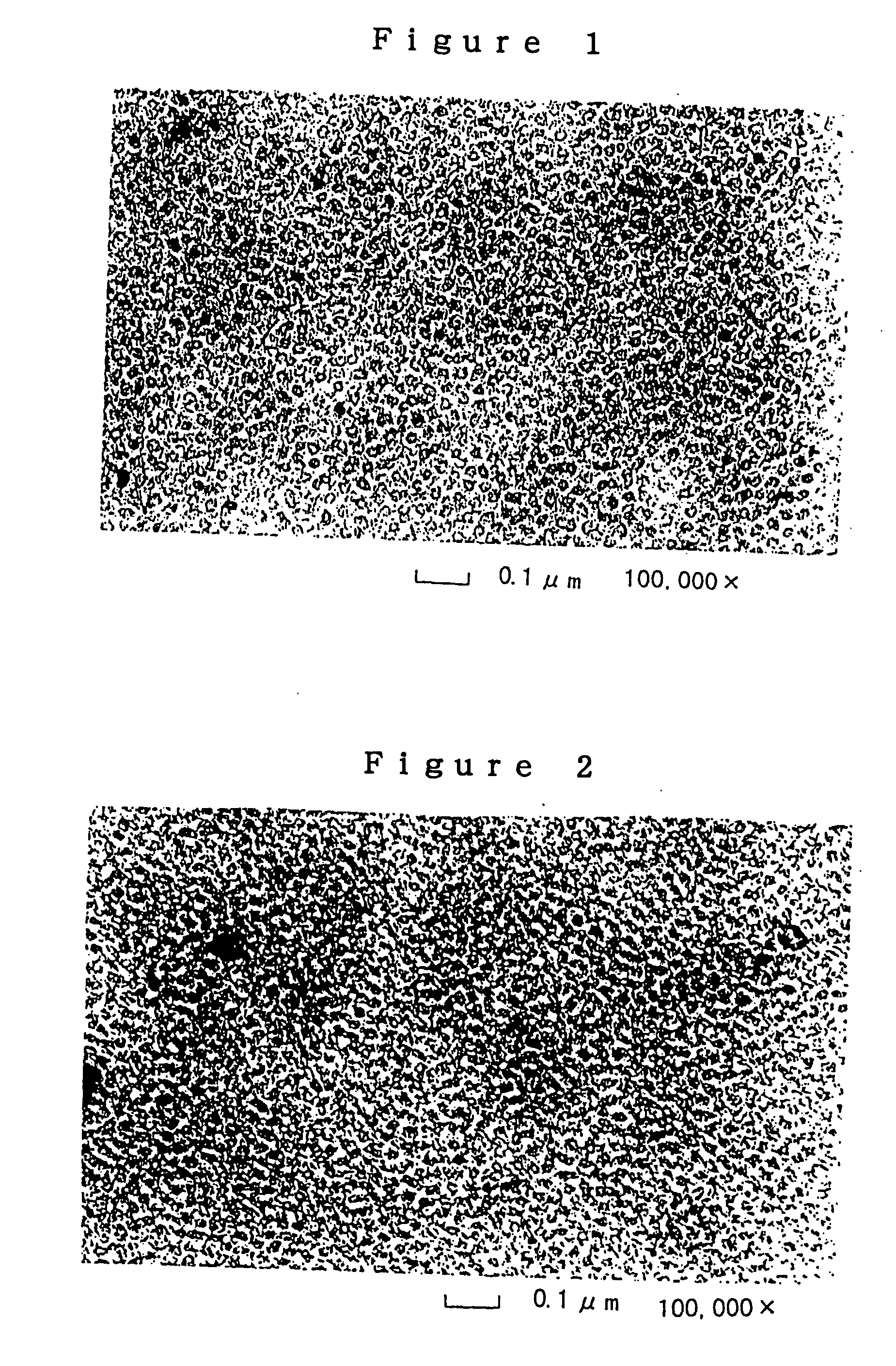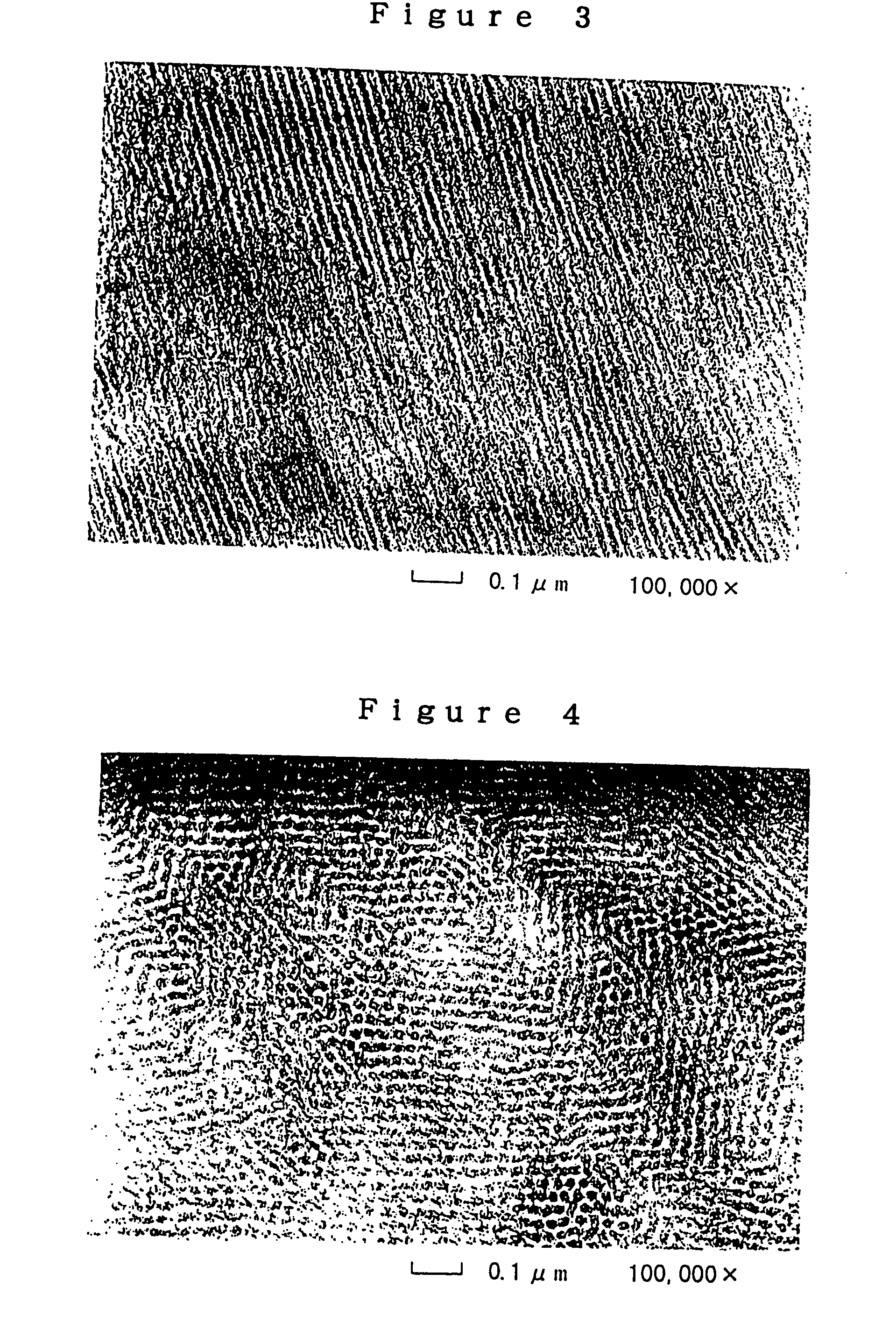Block copolymer
a copolymer and block technology, applied in the direction of adhesives, etc., can solve the problems of not bringing molding shrinkage, warpage, distortion, and satisfactory dimensional accuracy, and achieve the effect of preventing the formation (contamination) of by-products and good reproducibility
- Summary
- Abstract
- Description
- Claims
- Application Information
AI Technical Summary
Benefits of technology
Problems solved by technology
Method used
Image
Examples
example 1
[0199] (1) In a 200-ml three-neck flask with its inner atmosphere replaced with nitrogen gas, 92 ml of toluene, 4.5 ml of a 0.7 mol / liter solution of isobutylbis(2,6-di-tert-butyl-4-methylphenoxy)aluminum in toluene, and 2.4 g (27 mmol) of 1,2-dimethoxyethane as a polar additive were placed, were stirred and thereby yielded a homogenous solution. The solution was further treated with 0.15 ml (0.20 mmol) of a solution of sec-butyllithium (a cyclohexane solution having a concentration of 1.3 mol / liter).
[0200] (2) The solution was further treated with 3.75 g (37.5 mmol) of methyl methacrylate (hereinafter referred to as "MMA") as a first monomer with stirring at 0.degree. C. for 2 hours for polymerization. A part (2 ml) of the solution was then sampled from the polymerization system, was analyzed by .sup.1H-NMR and was found that an unreacted MMA was present only in a trace amount and a conversion from MMA was equal to or more than 99%. The sample was poured into 20 ml of methanol, a p...
example 2
[0223] (1) A polymer was obtained by the procedure of Example 1, except that 5.14 g (51.4 mmol) of the first monomer (MMA) was subjected to polymerization for 3 hours, that 14.0 g (109 mmol) of the second monomer (n-BA) was used, and that 0.86 g (8.6 mmol) of the third monomer (MMA) was used. The resulting polymer has an entire number average molecular weight of 112000 and a molecular weight distribution (Mw / Mn) of 1.02, in which the PMMA block obtained in the first MMA polymerization has a number average molecular weight of 27800.
[0224] (2) The polymer obtained in the process (1) has a block efficiency of substantially 100% as determined by HPLC analysis. The polymer was found to be a triblock copolymer containing 29.3 wt % MMA unit and 70.7 wt % n-BA unit, represented by formula: PMMA-PnBA-PMMA and comprising PnBA as an intermediate block and one each PMMA combined at both ends of the PnBA block.
[0225] (3) A further analysis of the above-prepared triblock copolymer revealed that t...
example 3
[0243] (1) A polymer was obtained by the procedure of Example 1, except that 4.50 g (45.0 mmol) of the first monomer (MMA) was subjected to polymerization for 3.5 hours with 0.10 mmol (0.077 ml of a cyclohexane solution having a concentration of 1.3 mol / liter) of sec-butyl lithium as the polymerization initiator, and that 0.50 g (5.0 mmol) of the third monomer (MMA) was used. The resulting polymer has an entire number average molecular weight of 201000 and a molecular weight distribution (Mw / Mn) of 1.02, in which the PMMA block obtained in the first MMA polymerization has a number average molecular weight of 45000.
[0244] (2) The polymer obtained in the process (1) has a block efficiency of substantially 100% as determined by HPLC analysis. The polymer was found to be a triblock copolymer containing 24.7 wt % MMA unit and 75.3 wt % n-BA unit, represented by formula: PMMA-PnBA-PMMA and comprising PnBA as an intermediate block and one each PMMA combined at both ends of the PnBA block.
[...
PUM
| Property | Measurement | Unit |
|---|---|---|
| glass transition temperature | aaaaa | aaaaa |
| molecular weight polydispersity | aaaaa | aaaaa |
| temperature | aaaaa | aaaaa |
Abstract
Description
Claims
Application Information
 Login to View More
Login to View More - R&D
- Intellectual Property
- Life Sciences
- Materials
- Tech Scout
- Unparalleled Data Quality
- Higher Quality Content
- 60% Fewer Hallucinations
Browse by: Latest US Patents, China's latest patents, Technical Efficacy Thesaurus, Application Domain, Technology Topic, Popular Technical Reports.
© 2025 PatSnap. All rights reserved.Legal|Privacy policy|Modern Slavery Act Transparency Statement|Sitemap|About US| Contact US: help@patsnap.com


